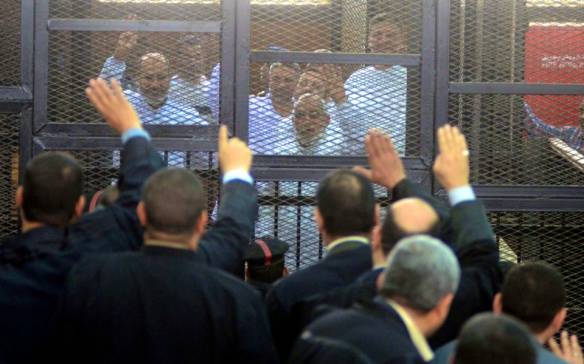Monday 24 March The South Sudanese government dropped their demand that the former detainees must be excluded from the IGAD peace talks if the talks are to proceed. Clashes between the SPLA and the SPLA-in-Opposition in Nasir County (Upper Nile). Tuesday 25 March Peace talks in Addis Ababa resumed. UN warned of a potential food… Read more »
Last Chance in the Middle East?
 This week, an Egyptian court sentenced 529 defendants to death after a two-day trial. Finally, after being mostly silent through more than half a year of brutal repression by Egypt’s military regime, Western governments expressed ‘shock’, judging the sentences to be ‘unacceptable’. Whatever the consequences this farcical trial will have for Western policies towards the military regime in Egypt (if any), it is probably going to be too little, too late. Since the military coup on 3 July 2013 over a thousand persons have been killed, and the super-rich Egyptians who fled the country after Mubarak’s ouster are starting to make preparations to return. The military is so far succeeding in overseeing a counter-revolution that will bring Egypt back to the good old days, minus the Mubarak family and their close friends.
This week, an Egyptian court sentenced 529 defendants to death after a two-day trial. Finally, after being mostly silent through more than half a year of brutal repression by Egypt’s military regime, Western governments expressed ‘shock’, judging the sentences to be ‘unacceptable’. Whatever the consequences this farcical trial will have for Western policies towards the military regime in Egypt (if any), it is probably going to be too little, too late. Since the military coup on 3 July 2013 over a thousand persons have been killed, and the super-rich Egyptians who fled the country after Mubarak’s ouster are starting to make preparations to return. The military is so far succeeding in overseeing a counter-revolution that will bring Egypt back to the good old days, minus the Mubarak family and their close friends.
Read more in the blog post published March 28, 2014 at the New Middle East Blog.
“Polite green men”
As the “polite green men” were taking control over the Crimea, another unit of Russian paratroopers landed on the Kotelny island, as TASS proudly reported. More extensive coverage of that high-risk exercise is here. An article in Nezavisimaya argued that “penetration of Greenpeaceniks and radical Islamists is a grave threat to the Russian Arctic“. This… Read more »
Fleeing Conflict in South Sudan
As peace talks in Addis Ababa resumed yesterday, five days later than scheduled owing to disagreements over participation, a political compromise still seems to be in the future. Meanwhile, the humanitarian impact of the conflict intensifies day by day. As the rainy season approaches and transportation becomes increasingly difficult, as many as 4.9 million people… Read more »
Egypt: Silence Implies Consent
Today’s death sentences of 529 supporters of the Muslim Brotherhood must bring an end to the Norwegian Government’s tacit acceptance of the military regime in Egypt.Read More
This Week in South Sudan – Week 12
Monday 17 March Japan announced that they will provide $1,5million to South Sudan in order to support the peace process. UNMISS prepares for the rainy season and relocated displaced in Juba. The pressure group Justice for Juba four (J4J4) demanded the release of the four detainees charged of treason. Clashes south-west of Rumbek, two SPLA… Read more »
This Week in South Sudan – Week 11
Monday 10 March An anti-UN protest took place in Juba as a response to the discovery of a UN convoy with arms. UN reported that the conflict in South Sudan has caused a record low food-security rate. Salva Kiir denied that he has formed a commission to prepare for SPLM leadership meeting. Tuesday 11 March… Read more »
Facilitating Peace in South Sudan
Yesterday, The Intergovernmental Authority on Development (IGAD) announced that it will employ a joint East African Protection and Deterrent Force (PDF) as a part of the agreement of cessation of hostilities in South Sudan (see previous blog post). According to the announcement, Ethiopia, Kenya, Burundi and Rwanda, possibly also Djibouti will contribute troops to the… Read more »
Rwanda, Research and the Wisdom of (Non)Responsiveness (or, Email is a Gift Not a Responsibility)
 As I prepare for the 20th anniversary of the Rwandan political violence of 1994 (i.e., the genocide, the interstate war, the civil war and the other forms of activity that are not easily named), I am reminded of earlier correspondence and how the modern period conceives of communication as well as what researchers must/need not respond to. EJ: Cue Rocky theme. You don’t need the link. It’s in your head already.
As I prepare for the 20th anniversary of the Rwandan political violence of 1994 (i.e., the genocide, the interstate war, the civil war and the other forms of activity that are not easily named), I am reminded of earlier correspondence and how the modern period conceives of communication as well as what researchers must/need not respond to. EJ: Cue Rocky theme. You don’t need the link. It’s in your head already.
Read more at PRIO Global Fellow Christian Davenport’s blog Analog – the Anti-Blog
This Week in South Sudan – Week 10
Monday 3 March UN observed large forces of rebels in support of SPLA/M-in-Opposition in Malakal and expressed fear of new clashes in the area. South Sudan United Democratic Alliances, in Ethiopian exile, stated that they support an interim government whithout Salva Kiir and Riek Machar. Riek Machar presented a list of his desired cabinet for… Read more »